NCERT Solutions Class 8 Mathematics
Chapter – 11 (Mensuration)
The NCERT Solutions in English Language for Class 8 Mathematics Chapter – 11 Mensuration Exercise 11.3 has been provided here to help the students in solving the questions from this exercise.
Chapter 11: Mensuration
- NCERT Solution Class 8 Maths Ex – 11.1
- NCERT Solution Class 8 Maths Ex – 11.2
- NCERT Solution Class 8 Maths Ex – 11.4
Exercise – 11.3
1. There are two cuboidal boxes as shown in the adjoining figure. Which box requires the lesser amount of material to make?
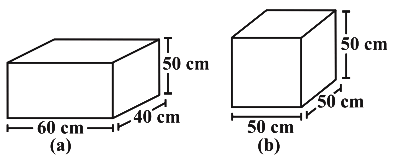
Solution –
(a) Length of cuboidal box (l) = 60 cm
Breadth of cuboidal box (b) = 40 cm
Height of cuboidal box (h) = 50 cm
Total surface area of cuboidal box = 2 × (lb + bh + hl)
= 2×(60×40+40×50+50×60)
= 2×(2400+2000+3000)
= 14800 cm2
(b) Length of cubical box (l) = 50 cm
Breadth of cubicalbox (b) = 50 cm
Height of cubicalbox (h) = 50 cm
Total surface area of cubical box = 6(side)2
= 6(50×50)
= 6×2500
= 15000
Surface area of the cubical box is 15000 cm2
From the result of (a) and (b), cuboidal box requires the lesser amount of material to make.
2. A suitcase with measures 80 cm x 48 cm x 24 cm is to be covered with a tarpaulin cloth. How many meters of tarpaulin of width 96 cm is required to cover 100 such suitcases?
Solution – Length of suitcase box, l = 80 cm,
Breadth of suitcase box, b= 48 cm
And Height of cuboidal box , h = 24 cm
Total surface area of suitcase box = 2(lb+bh+hl)
= 2(80×48+48×24+24×80)
= 2 (3840+1152+1920)
= 2×6912
= 13824
Total surface area of suitcase box is 13824 cm2
Area of Tarpaulin cloth = Surface area of suitcase
l×b = 13824
l ×96 = 13824
l = 144
Required tarpaulin for 100 suitcases = 144×100 = 14400 cm = 144 m
Hence tarpaulin cloth required to cover 100 suitcases is 144 m.
3. Find the side of a cube whose surface area is 600 cm2 .
Solution – Surface area of cube = 600 cm2 (Given)
Formula for surface area of a cube = 6(side)2
Substituting the values, we get
6(side)2 = 600
(side)2 = 100
Or side = ±10
Since side cannot be negative, the measure of each side of a cube is 10 cm
4. Rukshar painted the outside of the cabinet of measure 1 m × 2 m × 1.5 m. How much surface area did she cover if she painted all except the bottom of the cabinet?
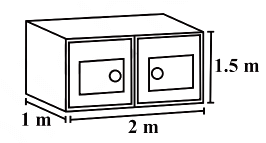
Solution – Length of cabinet, l = 2 m,
Breadth of cabinet, b = 1 m
Height of cabinet, h = 1.5 m
Surface area of cabinet = lb+2(bh+hl )
= 2×1+2(1×1.5+1.5×2)
= 2+2(1.5+3.0)
= 2+9.0
= 11
Required surface area of cabinet is 11m2.
5. Daniel is paining the walls and ceiling of a cuboidal hall with length, breadth and height of 15 m, 10 m and 7 m respectively. From each can of paint 100 m^2of area is painted. How many cans of paint will she need to paint the room?
Solution – Length of wall, l = 15 m,
Breadth of wall, b = 10 m
Height of wall, h = 7 m
Total Surface area of classroom = lb+2(bh+hl )
= 15×10+2(10×7+7×15)
= 150+2(70+105)
= 150+350
= 500
Now, Required number of cans = Area of hall/Area of one can
=
= 5
Therefore, 5 cans are required to paint the room.
6. Describe how the two figures below are alike and how they are different. Which box has larger lateral surface areas?
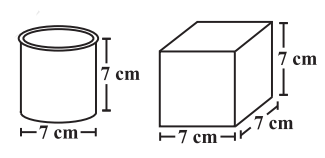
Solution –
Diameter of cylinder = 7 cm
Radius of cylinder, r = cm
Height of cylinder, h = 7 cm
Lateral surface area of cylinder = 2πrh
= 2× ×
× 7
= 154
So, Lateral surface area of cylinder is 154 cm2
Now, lateral surface area of cube = 4 (side)2
= 4×72
= 4×49
= 196
Lateral surface area of cube is 196 cm2
Hence, the cube has a larger lateral surface area.
7. A closed cylindrical tank of radius 7 m and height 3 m is made from a sheet of metal. How much sheet of metal is required?
Solution – Radius of cylindrical tank, r = 7 m
Height of cylindrical tank , h = 3 m
Total surface area of cylindrical tank = 2πr(h+r)
= 2 × × 7 (3 + 7)
= 44 × 10
= 440
Therefore, 440 m2 metal sheet is required.
8. The lateral surface area of a hollow cylinder is 4224cm2. It is cut along its height and formed a rectangular sheet of width 33 cm. Find the perimeter of rectangular sheet?
Solution – Lateral surface area of a hollow cylinder = 4224 cm²
Width of rectangular sheet = 33 cm
Let length of the rectangular sheet = l
Lateral surface area of cylinder = Area of rectangular sheet
4224 cm² = b × l
4224 cm² = 33 cm × l
l = cm = 128 cm
Thus, the length of the rectangular sheet be 128 cm
Perimeter of the rectangular sheet = 2 × (l + b)
= 2 × (128 cm + 33 cm)
= 2 × 161 cm = 322 cm
Thus, the perimeter of the rectangular sheet is 322 cm.
9. A road roller takes 750 complete revolutions to move once over to level a road. Find the area of the road if the diameter of a road roller is 84 cm and length 1 m.
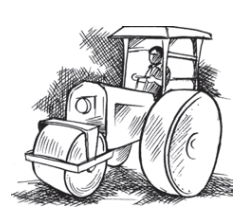
Solution – Diameter of road roller, d = 84 cm
Radius of road roller, r = d/2 = 84/2 = 42 cm
Length of road roller, h = 1 m = 100 cm
Formula for Curved surface area of road roller = 2πrh
= 2 × × 42 × 100
= 26400
Curved surface area of the road roller is 26400 cm2
Again, Area covered by the road roller in 750 revolutions = 26400×750cm2
= 1,98,00,000cm2
= 1980 m2 [∵ 1 m2= 10,000 cm2]
Hence the area of the road is 1980 m2.
10. A company packages its milk powder in cylindrical container whose base has a diameter of 14 cm and height 20 cm. Company places a label around the surface of the container (as shown in figure). If the label is placed 2 cm from top and bottom, what is the area of the label?
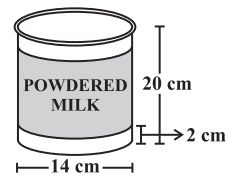
Solution – Diameter of the cylindrical container , d = 14 cm
Radius of cylindrical container, r = d/2 = 14/2 = 7 cm
Height of cylindrical container = 20 cm
Height of the label, say h = 20–2–2 (from the figure) = 16 cm
Curved surface area of label = 2πrh
= 2× × 7 × 16
= 704
Hence, the area of the label is 704 cm2.

Leave a Reply